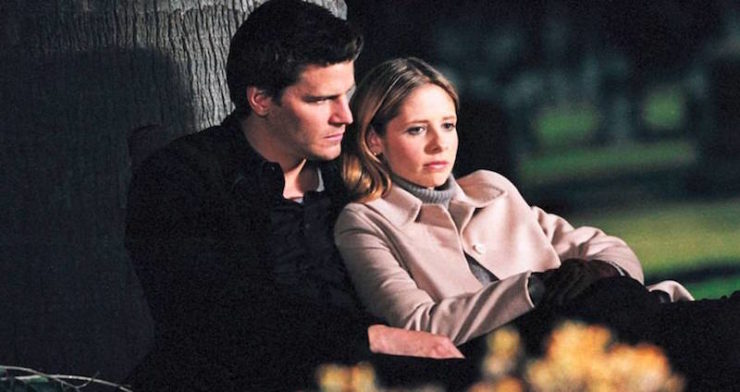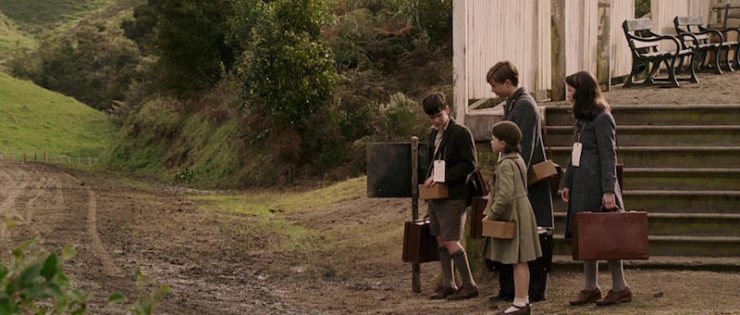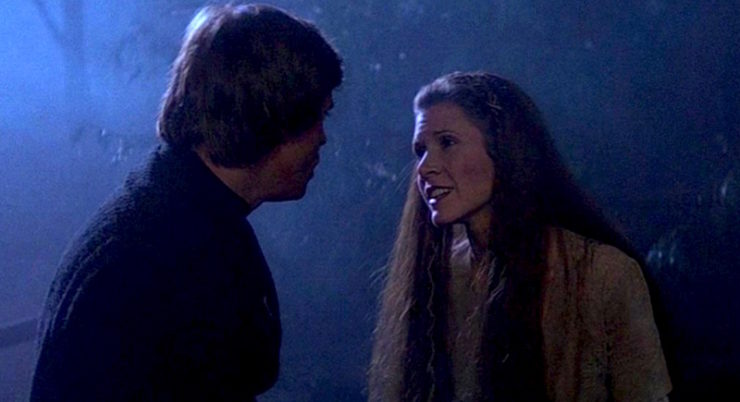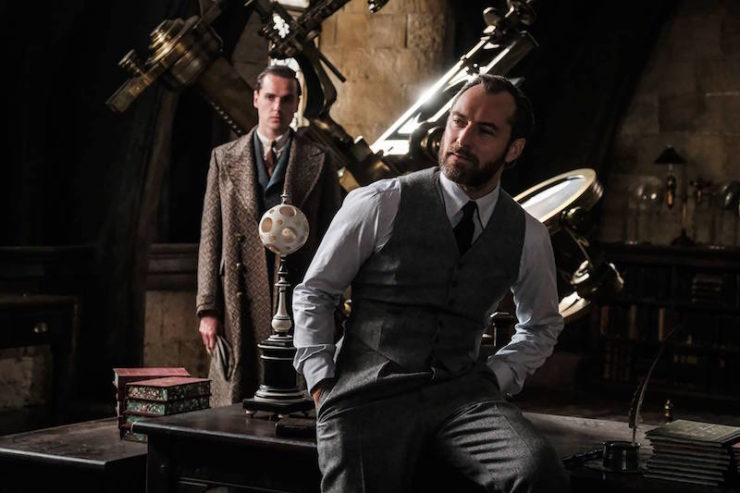Last week it was revealed that J.K. Rowling’s screenplay for Fantastic Beasts: The Crimes of Grindelwald will pretty much avoid the subject of Albus Dumbledore’s sexuality. Despite the fact that Dumbledore’s youthful infatuation with Gellert Grindelwald is a key factor in informing their meetings later in life, particularly during the point at which this film is set, as Grindelwald grows in power and Dumbledore is trying to avoid doing his utmost to stop him—a point in time when the shattered relationship between these two men is shaping the wizarding world in untold and terrifying ways.
In case anyone is confused about why this choice was made, director David Yates had this to say to Entertainment Weekly when asked about whether the film would address Dumbledore’s sexuality:
“Not explicitly. But I think all the fans are aware of that. He had a very intense relationship with Grindelwald when they were young men. They fell in love with each other’s ideas, and ideology and each other.”
Everyone just knows already? That’s… assuming a lot, to be honest.
To put this into perspective, after the release of Harry Potter and the Deathly Hallows in 2007, J.K. Rowling gave a reading at Carnegie Hall and took questions from the audience. When a fan asked about Albus Dumbledore’s past, Rowling dropped a fandom bomb: “I always thought of Dumbledore as gay. Dumbledore fell in love with Grindelwald, and that added to his horror when Grindelwald showed himself to be what he was.” In an instant, readers who may not have appreciated the subtext of Dumbledore and Grindelwald’s relationship had a completely different frame for everything that had happened between them in Deadly Hallows. This key piece of information is incredibly relevant to Dumbledore’s arc and choices in the upcoming film; seeing as the Fantastic Beasts sequel likely takes place in the late 1920s or early 1930s, viewers will be seeing Dumbledore before his great showdown with Grindelwald. This Albus is still too frightened to confront his old friend—a man that he loved—for fear of learning who truly killed Dumbledore’s sister during their last duel.
Refusing to make Albus’s sexuality and his early infatuation with Grindelwald explicit isn’t simply odd—it’s a confusing storytelling choice to make while actively trying to flesh out his early days. Dumbledore can be as cagey and secretive about his past with Grindelwald as he likes to other characters, but keeping the audience in the dark on the character’s motivation is a baffling move. A baffling move made more suspect than ever in that it keeps one of the Potterverse’s only known queer characters functionally in the closet.
Let’s remember some of our favorite moments where not making the history between characters explicit rendered a story so much more enjoyable and easy to comprehend. This subtext-only approach to storytelling has always worked, as you can see from this proof I have laid out for you.
Buffy: The Vampire Slayer

Buffy is a really cool person. Who also slays vampires, and also occasionally falls in love with them. At least, she fell in love with Angel—the vampire with a soul—and then they slept together, which led to Angel getting really mean. Afterward, Buffy wanted to know if maybe sleeping together had caused Angel to lose that very important soul, and he replied, “…Not explicitly.”
The Lion, the Witch, and the Wardrobe

This classic begins with the Pevensie children being sent out of London to a stranger’s house, where they were meant to live for the foreseeable future. Probably because their parents fancied a holiday away from their kids? People send their children away to stay at unknown people’s houses all the time.
Star Wars: The Return of the Jedi

We all remember how Luke Skywalker got his hand cut off in The Empire Strikes Back and screamed “Nooooo” and nothing else happened. And then Yoda died without confirming anything. Eventually leading to this memorable exchange between Luke and Leia:
LUKE: I have to face him.
LEIA: Why?
LUKE: …he’s a very important guy, Leia. Like, one of the most important guys in the Empire. Seems like that should be my job right now, taking out very important guys in the Empire. And if I don’t make it back, you’re the only hope for the Alliance.
LEIA: Luke, don’t talk that way. You have a power I don’t understand! Could never have!
LUKE: You’re wrong, Leia. You have that power, too. In time you’ll learn to use it as I have. The Force runs… all over the dang place. Vader has it. I have it, and… I’m pretty sure you have it.
LEIA: Why would you think that?
LUKE: I have no idea, it just sounds incredibly plausible.
For what it’s worth, J.K. Rowling already weighed in on this topic during a press conference two years ago:
“I can’t tell you everything I would like to say because this is obviously a five-part story so there’s lots to unpack in that relationship. You will see Dumbledore as a younger man and quite a troubled man—he wasn’t always the sage…We’ll see him at that formative period of his life. As far as his sexuality is concerned … watch this space.”
And we did watch the space, and now it’s two years later. We’re being told that we’re all aware enough of the history that it’s not important to bring up in this film. In fact, Rowling is pretty angry that it’s an issue at all:
Being sent abuse about an interview that didn't involve me, about a screenplay I wrote but which none of the angry people have read, which is part of a five-movie series that's only one instalment in, is obviously tons of fun, but you know what's even *more* fun? pic.twitter.com/Rj6Zr8aKUk
— J.K. Rowling (@jk_rowling) January 31, 2018
Hey, to start: no one should be sending people abuse online. Under any circumstances. Just don’t. This should go without saying, but it apparently never does, so here is a reminder.
But also, Rowling appears to be following the “it’s part of a series, don’t bother me about it” script, and at the danger of repeating myself, Hollywood really has to stop using that old “wait for another three films!” approach. At a certain point, it just ends up looking like you’re withholding that information from the franchise until the very end, so you can make all the money and not get bogged down in outrage when homophobes inevitably get up in arms about Dumbledore’s sexual orientation being a part of the story. After neglecting to have this information in the book series, it’s adding insult to injury. The movie doesn’t have to harp on the subject, but letting LGBTQ fans know that their concerns are heard and valid would be nice for a change. Allowing Albus Dumbledore’s identity as a gay man to exist visibly in the story would be invaluable to so many fans and filmgoers. Add this patent disregard to Johnny Depp’s continued employment in the film, and the prospect of this film gets less exciting by the second.
Subtext isn’t good enough when it’s all you ever get. Fans shouldn’t have to wait four or five films when they’ve already bought into a world for seven books and beyond. An announcement made during a Q&A stops counting if you never make good on your reveal. Let Albus Dumbledore enjoy his knitting patterns in the sun.










